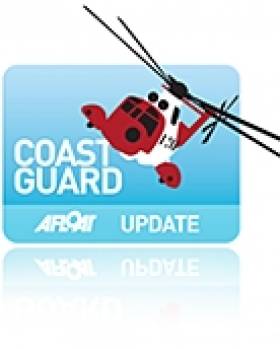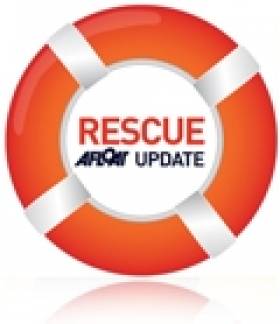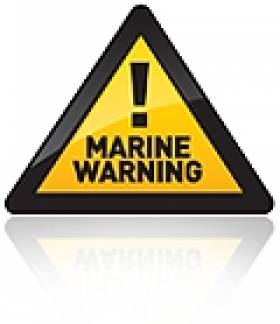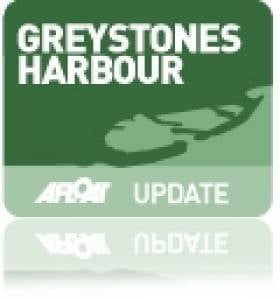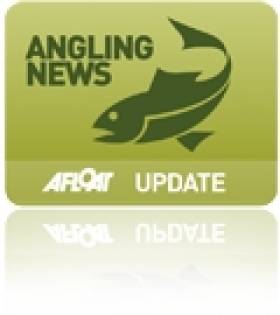Displaying items by tag: anglers
#SAR – The search for two missing anglers off the Isle of Man coast continues today.
Liverpool Coastguard has been working with the Isle of Man Coastguard to find two missing anglers.
Their upturned dinghy was found five miles off the Isle of Man coast at 6.20am on Saturday morning. The men, both in their 60's and from the Isle of Man were reported overdue after failing to return from a fishing trip on Friday afternoon.
Liverpool MRCC (Maritime Rescue Coordination Centre) has coordinated an air and sea search covering over 360 square miles of sea, involving RNLI lifeboats from Ramsey, Peel, Port Patrick and Port Erin with rescue helicopters from RAF Valley and RNAS Prestwick.
The Maritime and Coastguard Agency's fixed wing aircraft was involved in the search this morning but has returned to base due to fog in the search area.
Angler Dies After Lough Corrib Incident
#RESCUE - One angler has died in hospital and another was receiving emergency treatment last night after their boat got into difficulty on Lough Corrib.
According to The Irish Times, the two men were among a party of three on a boat that was struck by a wave off Annaghdown, which knocked one of them into the water.
Though he was reportedly wearing a lifejacket before he went overboard, an empty jacket was then spotted floating on the surface. One colleague entered the water to search for him but was unsuccessful.
Responding to the distress call from a nearby angling boat, the Irish Coast Guard's Shannon helicopter located the missing angler soon after arriving on scene, some 50 minutes after he entered the water.
The man was airlifted to University Hospital Galway, with the coastguard chopper returning for his colleague when he showed signs of hypothermia.
A small craft warning from Met Éireann was in effect throughout the area at the time of the incident.
The Irish Times has more on the story HERE.
Full Moon Prompts Weekend Safety Warning
Spring Tides and an uncertain weather forecast can make this weekend more hazardous than usual.
Irish Water Safety is reminding boaters, sailors, surfers, divers and anglers that there is a full moon on Saturday so they need to be aware of spring tides for the weekend coupled with an uncertain weather forecast.
It is important to take a good weather forecast and to factor this in to their plans accordingly. In addition we wish to remind you of the shorter daylight hours and not to be too ambitious when passage planning over the weekend.
On average 153 people drown in Ireland each year so it is essential to wear suitable protective clothing and a properly serviced and fitted lifejacket when on the water and avoid taking unnecessary risks, especially taking alcohol or drugs as approximately 30% of all drowning victims will have consumed alcohol.
Anglers will be at risk and non nationals in particular should be extremely vigilant as the Atlantic swell is dramatically different to that experienced on the relatively calmer Baltic Sea to which many are accustomed.
It is essential that parents or responsible adults supervise their children at all time when near water.
Walkers should remain alert and stay well away from the edge of ordinarily familiar waterside pathways due to the risk of stranding as a result of the high tides.
Remember your lifeline in an emergency is 999 and 112 therefore carry a mobile phone and ask for the Marine Rescue.
If you discover missing or found Ringbuoys then log on to www.ringbuoys.ie to report them, remember, "a stolen ringbuoy is a stolen life"
Greystones Harbour Facilities to be Complete by End 2011
Tuesday nights Greystones Town Council meeting was informed by Greystones harbour developer Sispar that the major work on the seawalls would be complete at the end of November 2010.
Following this, construction of the Health Centre, public square and Community buildings for the Sea Scouts, Rowers, Anglers, Divers and Sailors will start in January and should be complete in December 2011.
The hoardings which have blocked the view of the harbour and proposed marina will be taken down as these works are completed in 2011.
Local councillor Derek Mitchell (and a Ruffian keelboat champion) told Afloat.ie: "I welcome this as Greystones had been trying to get the harbour rebuilt for over a hundred years and this will create the best Community Harbour in Ireland".
Councillor Mitchell adds "The developer has applied to change some of the housing and add 34 houses to the North. Wicklow County Council is to vote on this in December. These houses may not be built yet, depending on the housing market, but access will be provided across the site to the North Beach and the new swimming beach there"
"The meeting was also told that the loan would be going in to NAMA, as all loans will, however this is not expected to make any difference to the project", he added.
Councillors asked for more Community tours so that people could see what has been achieved.
Minister Lenihan launches €2million Celtic Sea Trout Project
The Celtic Sea Trout Project has its official launch at Coillte's Avondale House, Rathdrum, Co. Wicklow this evening. This groundbreaking €2million project, mainly funded by the Wales – Ireland Interreg programme, will see Inland Fisheries Ireland work closely with anglers, fishery owners, netsmen, inshore and offshore marine fishermen and in cooperation across the 6 political and administrative regions with separate jurisdictions over the Irish Sea with the ultimate goal of ensuring sustainable sea trout fisheries.
Sea trout support and sustain important and valuable fisheries throughout the study area and are a unique and potentially valuable indicator of environmental change and the quality of the aquatic environment. The overall project aims are to further the proactive conservation of trout biodiversity and to enable better management of sea trout stocks in their freshwater and marine environments so as to strengthen their social, economic and cultural benefits to local and regional communities. It also aims to promote cooperative working, the effective dissemination of knowledge and a wider general awareness of management needs and options for the conservation and sustainable management of sea trout stocks.
Launching the project Minister Conor Lenihan commented that "the Celtic Sea Trout project represents a major step forward to achieving our ultimate goal of maintaining healthy fish stocks that support biodiversity, sustainable fisheries and provide optimum benefits for the general community as a whole".
For further information on the Celtic Sea Trout Project please log on to www.celticseatrout.com


























